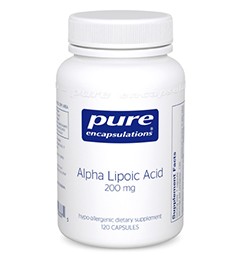| Back to Back Issues Page |
 |
|
Healthy Living in a Toxic World, Issue #15 December 03, 2015 |
Good Evening,LIPOIC ACID IS AN IMPORTANT SUPPLEMENT FOR MOLD TOXICITYPharmaceutical companies are spending a lot of time and energy on developing a drug that helps with mitochondrial dysfunction which is one of the major causes of the chronic diseases that occur as part of the aging process. They are trying to form a patentable version of a natural compound called lipoic acid because for almost two decades scientists have known that lipoic acid is an effective solution to mitochondrial dysfunction. Clinical trials all over the world show the promise of lipoic acid’s benefits on a wide range of diseases—from diabetes, obesity and cancer to cardiovascular disease and Alzheimer’s and many more chronic degenerative diseases of aging. As a clinician, I have noticed people exposed to toxic mold and suffering from the effects, even though they are still in a toxic environment, are helped tremendously by lipoic acid. This is probably due to it's tremendous liver detoxification abilities as well as its powerful anti- inflammatory effects. Alpha-lipoic acid is an antioxidant used in Europe to promote liver and nerve health, and confer protective benefits against oxidative processes. Alpha-lipoic acid has been called the “universal” antioxidant because it boosts glutathione levels in cells already within a normal range and has potent antioxidant actions. Research has strongly implicated cellular oxidative damage caused by free radicals as a cause of many degenerative problems. What makes alpha-lipoic acid so effective as an antioxidant is its ability to quench free radicals in both aqueous and lipid environments. This means that the antioxidant activity of alpha-lipoic acid is working in the extra-cellular fluid and also within the cell. It also has metal chelating ability, helping the body rid itself of accumulated ingested toxins. Alpha-lipoic acid also is a cofactor for some of the key enzymes (alpha keto acid dehydrogenases) involved in generating energy from food and oxygen in mitochondria and thus plays a critical role in energy production within the cell’s mitochondria. One of the most beneficial effects of alpha-lipoic acid is its ability to regenerate other essential antioxidants such as vitamins C and E, coenzyme Q10, and glutathione, and the activities of superoxide dismutase (SOD) and glutathione peroxidase (GPx). The evidence is especially strong for the ability of DHLA (dihydrolipoic acid, a reduced form of alpha-lipoic acid) to recycle vitamin E. This is apparently achieved directly by quenching tocopherol radicals or indirectly by reducing vitamin C or increasing the levels of ubiquinol (a derivative of CoQ10) and glutathione, that, in turn, helps regenerate tissue levels of vitamin E. In clinical studies to date with alpha-lipoic acid, there have been no reported serious adverse side effects, even at high doses. Among the mild, reversible side effects found in some patients have been allergic skin reactions and possible hypoglycemia in diabetics. R-lipoic acid provides a more biologically active form of lipoic acid than alpha-lipoic acid at a slightly higher cost, however, virtually all of the published studies of LA supplementation in humans have used Alpha Lipoic acid (which contains about a 50/50 mix of S-Lipoic Acid and R-Lipoic Acid). At present, it is not clear whether R-Lipoic Acid supplements are more effective than Alpha Lipoic Acid supplements in humans. And for that reason, at this time, I recommend Alpha Lipoic Acid instead of R-Lipoic Acid. I think a good dose to take would be 200 mg one to three times daily because most studies have used about 600 mg per day.
LIPOIC ACID 200 MG (available as 60 for $30.30 or 120 capsules for $55.10)CLICK HERE TO ORDER LIPOIC ACID OFF MY WEBSITE
WISHING YOU GOOD HEALTH,Dr. Mary Ray DO
|
| Back to Back Issues Page |

